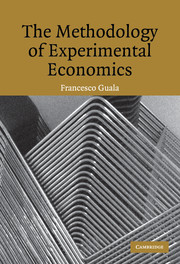Book contents
- Frontmatter
- Contents
- Analytical Table of Contents
- Acknowledgments
- 1 Introduction
- PART ONE INFERENCES WITHIN THE EXPERIMENT
- PART TWO INFERENCES FROM THE EXPERIMENT
- 7 External Validity
- 8 Economic Engineering
- 9 From the Laboratory to the Outside World
- 10 Experiments as Mediators
- 11 On Monetary Incentives
- Appendix A
- Appendix B
- Bibliography
- Index
7 - External Validity
Published online by Cambridge University Press: 10 December 2009
- Frontmatter
- Contents
- Analytical Table of Contents
- Acknowledgments
- 1 Introduction
- PART ONE INFERENCES WITHIN THE EXPERIMENT
- PART TWO INFERENCES FROM THE EXPERIMENT
- 7 External Validity
- 8 Economic Engineering
- 9 From the Laboratory to the Outside World
- 10 Experiments as Mediators
- 11 On Monetary Incentives
- Appendix A
- Appendix B
- Bibliography
- Index
Summary
The first part of this book is devoted to inferences within the experiment. Among such inferences, I single out causal ones as especially important. The experimental method is the most powerful tool for finding out about causal relations. Experiments, in principle, allow the variation of a putative causal factor while keeping all the other relevant circumstances fixed, so as to observe the effect of that factor acting alone on the system under study. By iterating this procedure, the influence of all the putative causes can, in principle, be studied and various hypotheses tested. In the laboratory, such an investigation can be carried out in privileged conditions, under which background circumstances can be kept constant, disturbing factors shielded, and putative causes triggered at will.
Experimental scientists thus look for causal relations in very special settings, which are rarely if ever instantiated in the “real world” outside the lab. However, often they are not interested in what happens under these circumstances per se. Rather, they want to extrapolate from the specific experimental setup to learn something of more general applicability. When medical researchers investigate the effects of a drug on laboratory rats, they are usually looking for a result that can be generalized from mice to men, to cure fellow human beings suffering from some condition. Similarly, most economists are not particularly interested in what happens when a group of undergraduate students play lottery games.
- Type
- Chapter
- Information
- The Methodology of Experimental Economics , pp. 141 - 160Publisher: Cambridge University PressPrint publication year: 2005



